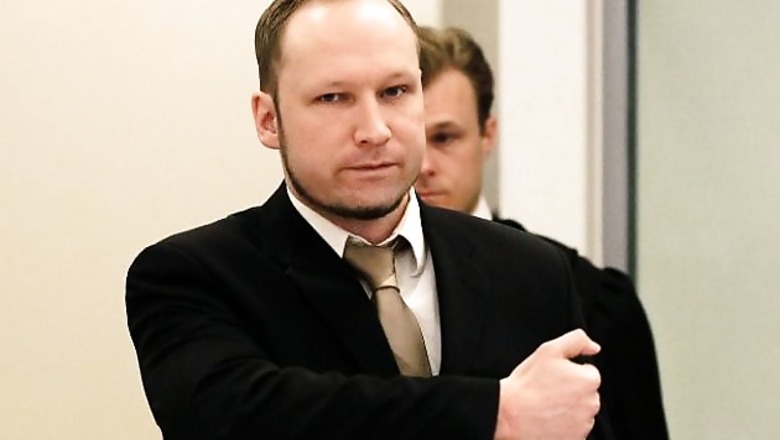
views
Oslo: Anders Behring Breivik on Tuesday defended his massacre of 77 people, insisting he would do it again and calling the bomb-and-shooting rampage the most "spectacular" attack by a nationalist militant since World War II.
Reading a prepared statement in court, the anti-Muslim extremist lashed out at Norwegian and European governments for embracing immigration and multiculturalism.
He claimed to be speaking as a commander of an "anti-communist" resistance movement and an anti-Islam militant group he called the Knights Templar. Prosecutors have said the group does not exist.
Maintaining he acted out of "goodness not evil" to prevent a wider civil war, Breivik vowed, "I would have done it again."
Breivik has five days to explain why he set off a bomb in Oslo's government district, killing eight, and then gunned down 69 at a Labor Party youth camp outside the Norwegian capital. He denies criminal guilt saying he was acting in self-defence.
"The attacks on July 22 were a preventive strike. I acted in self-defense on behalf of my people, my city, my country," he said as he finished his statement Tuesday. "I, therefore, demand to be found innocent of the present charges."
Breivik's testimony was delayed after a citizen judge was dismissed for his comments online the day after the attack that Breivik deserves the death penalty. Lawyers on all sides had requested that lay judge Thomas Indreboe be taken off the trial.
He was replaced by backup lay judge Elisabeth Wisloeff.
Breivik is being tried by a panel of two professional judges and three lay judges, local politicians who are appointed for four-year terms and participate on an equal basis as the judges in deciding guilt and sentencing. The system is designed to let ordinary people have a role in the Norwegian justice system, though the lead judge still runs the trial.
As at the start of the trial on Monday, Breivik entered the court smirking before flashing a clenched-fist salute.
Survivors of the massacre have worried he will use his testimony as a platform to promote his extremist views. The key issue for the court to decide is whether Breivik is psychotic.
Judge Wenche Elisabeth Arntzen repeatedly interrupted Breivik asking him to keep his statement short.
"It is critically important that I can explain the reason and the motive" for the massacre, Breivik said.
According to Breivik, Western Europe was gradually taken over by "Marxists and multiculturalists" after World War II, because it didn't have "anti-communist" leaders like US Senator Joseph McCarthy. The senator dominated the early 1950s by his sensational but unproved charges of Communist subversion in high government circles in the US.
His probes gave rise to the term McCarthyism, which describes the persecution of innocent persons on the charge of being Communists.
"But even McCarthy was too moderate," Breivik said.
On Monday, Breivik rejected the authority of the court, calling it a vehicle of the "multiculturalist" political parties in power in Norway. He confessed to the "acts" but pleaded not guilty.
Even his lawyers concede his defense is unlikely to succeed, and said the main thing for them was to convince the court that Breivik is not insane.
One psychiatric examination found him legally insane while another reached the opposite conclusion. It is up to the panel to decide whether to send him to prison or compulsory psychiatric care.
Breivik could face a maximum 21-year prison sentence or an alternate custody arrangement that would keep him locked up as long as he is considered a menace to society.
















Comments
0 comment